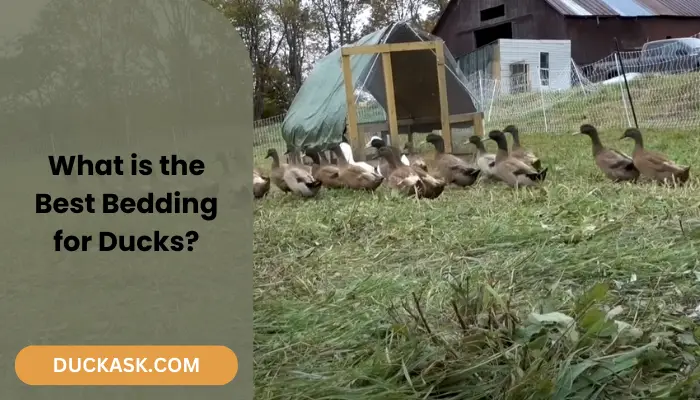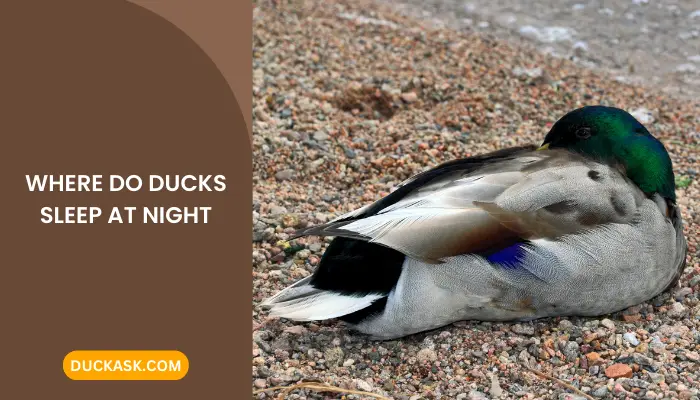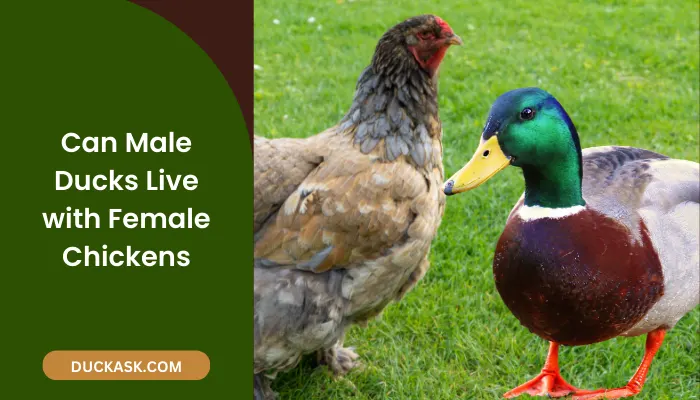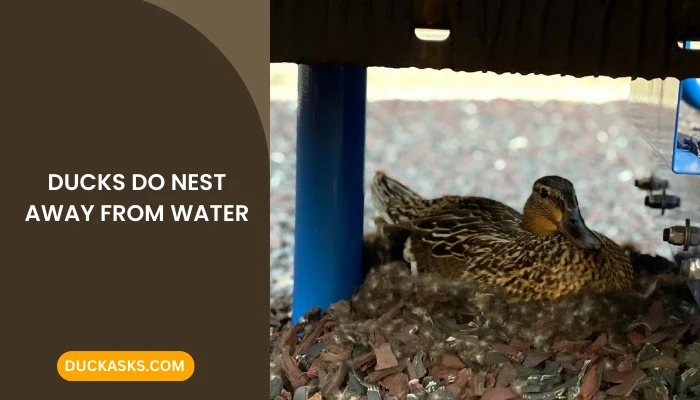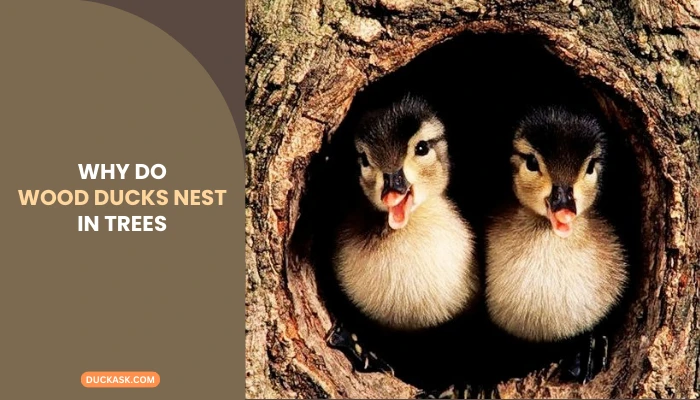When Do Ducklings Leave the Nest?
Have you ever come across a family of ducks waddling by and wondered when do ducklings leave the nest for the first time?
Ducklings are known for their adorable appearance and waddling gait, but when it comes to leaving the nest, they are surprisingly quick to take the plunge. In fact, ducklings are known for leaving the nest just a day or two after hatching. But why do they do this, and what happens next?
In this article, we’ll take a closer look at the fascinating world of duckling development and learn more about when and why these cute little birds leave their nest.
Want to know more about ducks habitat:
When Do Ducklings Usually Leave the Nest: A Complete Overview
Ducklings typically leave the nest within 24 to 36 hours after hatching. This is because the mother duck will lead her brood to the water source, where they will find food and safety from predators. Ducklings are precocial, which means they are born with down feathers and can walk and swim shortly after hatching.
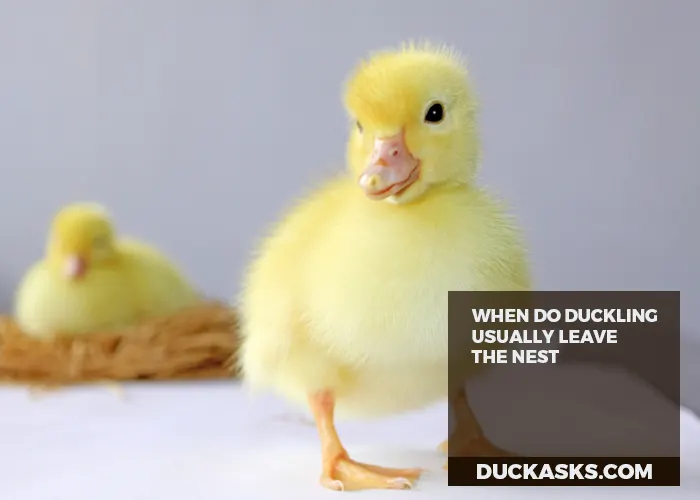
Once they reach the water, the mother duck will continue to care for and protect her ducklings for several weeks until they are able to fend for themselves. During this time, the ducklings will learn important survival skills, such as how to find food and avoid predators.
Note: However, it’s best to leave ducklings in the care of their mother whenever possible, as she is the best source of protection and guidance for her young. If you find a lost duckling, contacting a local wildlife rehabilitation center for assistance is best, as raising wild animals can be a complex and challenging task.
How Do Ducklings Know When to Leave the Nest?
Ducklings typically know when to leave the nest by following their mother’s cues. Mother ducks will usually start calling to their ducklings while they are still in the eggs, and once the ducklings hatch, they will recognize their mother’s voice and follow her lead.
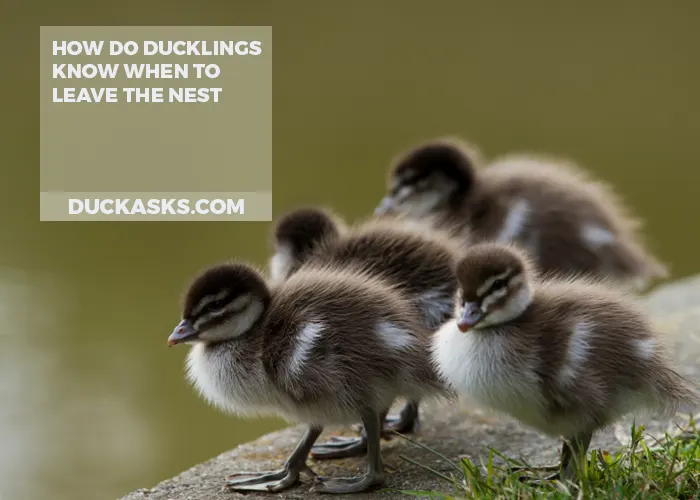
In addition to vocal cues, mother ducks also use visual and tactile cues to communicate with their young. For example, they may use their beak to gently nudge their ducklings in the direction they want them to go, or they may spread their wings to signal that it’s time to move on.
Once the mother duck leads her brood to the water, the ducklings will typically follow her into the water and start swimming and foraging for food.
It’s important to note that while ducklings may be able to leave the nest on their own, they are not yet fully independent. They still require certain guidance and protection from their mother.
What Happens to Ducklings That Don’t Leave the Nest?
Ducklings that don’t leave the nest may face several challenges and risks. If they remain in the nest for too long, they may become vulnerable to predators and rough conditions. In addition, if the mother duck leaves the nest, the ducklings may become separated and unable to find their way to food or safety.
It’s also possible that the ducklings may not leave the nest if they are sick, injured, or have developmental issues. In these cases, it’s important to seek assistance from a wildlife rehabilitator or veterinarian who can provide appropriate care and treatment.
In general, it’s best to leave wild animals alone and allow them to follow their natural instincts. If you come across a duckling that appears lost or abandoned, it’s best to contact a local wildlife rehabilitation center for assistance. They can guide how to help the animal and ensure appropriate care and treatment.
How Long Do Ducklings Stay With Their Mother?
The exact length of time that ducklings stay with their mother can vary depending on the species of duck and environmental conditions. Most ducklings will develop their adult feathers at around 6-8 weeks. During this point, they will become more independent and start to venture out on their own.
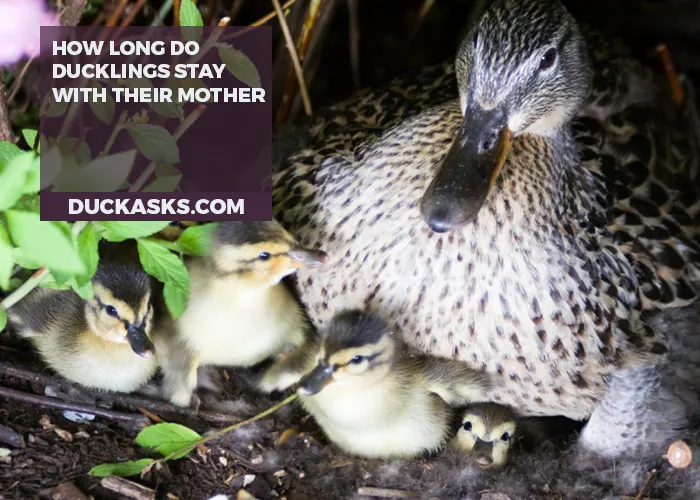
However, some species of ducks may stay with their mother for longer periods of time. For example, Muscovy ducks are known for their extended parental care and may remain with their mother for up to 4 months.
Do All Duck Species Leave the Nest at the Same Time?
No, not all duck species leave the nest at the same time. The timing of when ducklings leave the nest can vary depending on the duck species and environmental conditions.
Some ducks, such as mallards, typically leave the nest within a day or two of hatching. Other species, such as wood ducks, may wait up to 24 hours before leaving the nest.
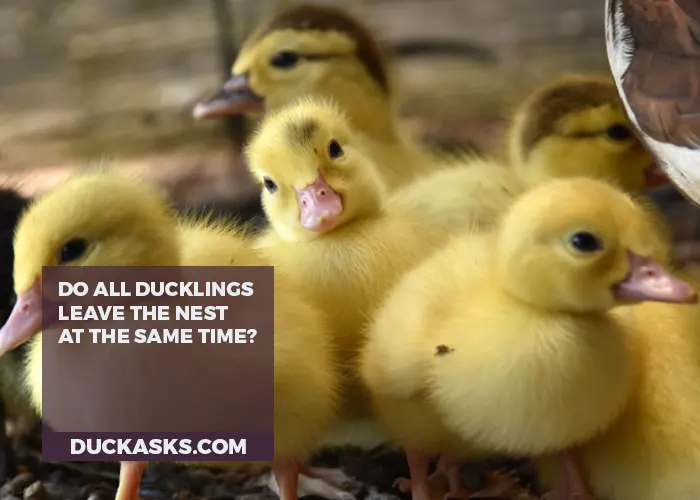
In addition to the timing of when ducklings leave the nest, the behavior of the mother duck can also vary between species. For example, some ducks may lead their ducklings to water immediately after hatching, while others may wait until they are a few days old.
How Do Ducklings Learn to Swim and Find Food?
Ducklings are born with a natural instinct to swim and find food, but they still need to learn and develop these skills over time. Learning to swim and find food typically involves a combination of observation, practice, and guidance from the mother duck.
Swimming is a critical survival skill for ducklings, allowing them to escape predators and find food in aquatic environments. Mother ducks will often lead their ducklings to water soon after hatching, and the ducklings will instinctively paddle and splash around in the water.
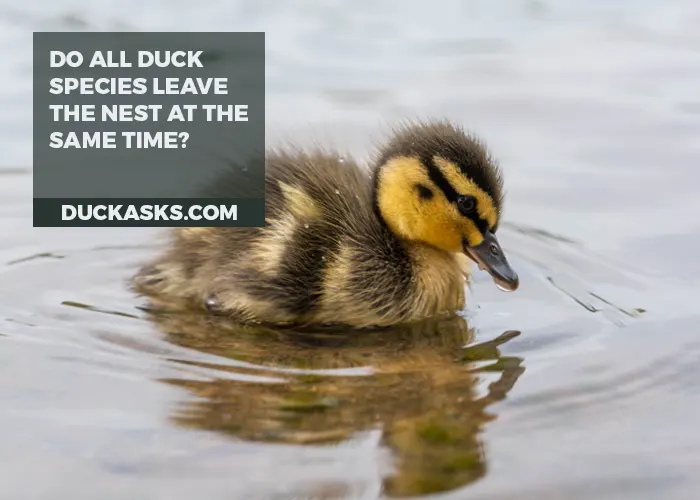
As the ducklings become more comfortable in the water, they will learn essential skills such as diving, staying afloat, and paddling in different directions.
Finding food is another important skill that ducklings must learn to survive. Mother ducks will often lead their ducklings to areas where food is abundant, such as shallow water with vegetation or insects.
Ducklings will observe their mother’s behavior and learn to forage for food by watching and imitating her actions.
As the ducklings grow and become more independent, they will explore their environment and find food independently. This process can take several weeks or even months, depending on the duck species and environmental conditions.
Overall, the process of learning to swim and find food is essential for the survival of ducklings, and it relies heavily on the guidance and support of the mother duck.
Wrapping Up
While some ducklings may leave the nest within a day of hatching, others may stay with their mother for several weeks or longer.
Regardless of when they leave the nest, ducklings are resilient and adaptable creatures capable of thriving in various environments. Understanding their behavior and needs can help ensure that these adorable waterfowl continue to thrive for generations to come.
Lastly, if you found this article informative and helpful, we’d love for you to share it with your friends and family. And stay connected with us on Facebook, Twitter, and Pinterest.
Article References:
- https://onlinelibrary.wiley.com/doi/full/10.1002/ece3.5146
- https://www.wrsos.org/ducklings-and-nests
Image Credit:
- Canva.com/photos

